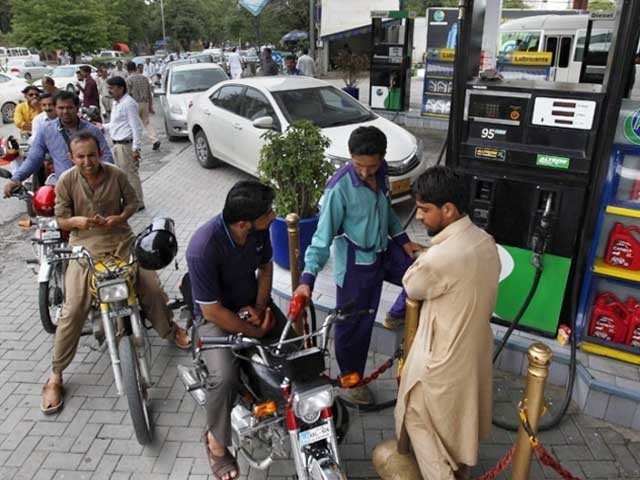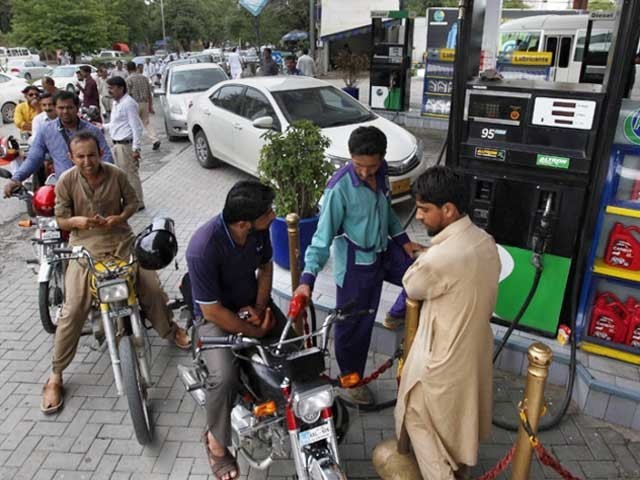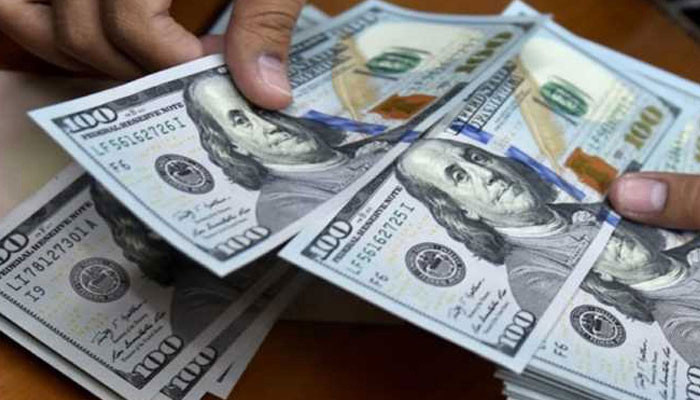
The country’s employment is moving towards the middle class and middle class business realities as this segment also pays the highest taxes—Photo: File
Despite knowing the decline of Pakistan’s economy and the financial condition of the people, the rates of almost all types of energy are being continuously increased. More than 26 rupees have been added in the last day. This increase is based on the global market situation.
The current prices of petroleum products have been set for two weeks only, considering the conditions, it seems that after two weeks, the prices of petroleum products will be increased. Now, one liter of petrol at the petrol pump is Rs. 331.38. I will sell. Meanwhile, news of increase in gas prices is also coming. According to the newspaper, the price of gas is likely to increase by 50%.
During a press briefing yesterday, caretaker Federal Finance Minister Shamshad Akhtar has said that the target set with the IMF will be met by bringing those who do not pay tax into the tax net, making the process of tax collection easier. Inflation has come down from 38% to 27% due to government initiatives, Finance Minister announced five schemes to promote remittances through legal means.
Briefing the media along with Information Minister Murtaza Solangi and others, caretaker finance minister Shamshad Akhtar said that we have come out of some difficulties, the country is facing many problems, we are not afraid of problems, we are doing all possible to compete. Government initiatives have led to improvements in many sectors, with the passage of time economic hardships are disappearing and foreign exchange reserves are increasing.
The government is taking steps to bring foreign investment into the country, inflation has come down from 38% to 27%, curbing smuggling has improved the value of the rupee, government initiatives have improved crop production. If they succeed in bringing in foreign investment, the economic conditions will improve, even if the State Bank does not increase the interest rate, it will also improve, measures are also being taken to run the local industry, the target that was set with IM. Will fulfill it.
The tax net target is to be met for the sake of Pakistan, measures are being taken to control currency smuggling, petroleum product prices are adjusted due to global market prices. The country’s trade deficit in the first two months of the current fiscal A decrease of 39% was recorded on annual basis.
According to the statistics of the State Bank, Pakistan’s trade deficit in July and August was recorded at 3.948 billion dollars, which is 39% less than the same period of the previous financial year. On the other hand, in the first two months of the current fiscal year, a 6% decrease was recorded in the exports of food items from the country on an annual basis.
The government has increased the rate of interest on Naya Pakistan Certificates, according to the State Bank, the rate of interest for 3-month Naya Pakistan Certificates in US dollars has been increased from 7% to 8.25%.
The interest rate on three-month Naya Pakistan Certificates in British Pound has been increased from 5.50% to 7.25%. The interest rate on Naya Pakistan Certificates in Euro has been increased from 4% to 6.25%. Three-month Naya Pakistan Certificates in Pakistani currency But the profit rate has been increased from 15% to 21%, on 6-month period certificates increased from 15.25% to 21.25%, on one-year period certificates the rate of profit has been increased from 15.50% to 21.50% while on 3-year period certificates the rate of profit is 14%. From 17.50% to 17.50% and the rate of interest on 5-year certificates was increased from 13.50% to 15%.
This was essential to increase fund acquisition through RDA, which was dwindling due to increases in profits by other countries, with Pakistan paying a 2-3 percent premium on profits, while the US is also giving the same premium on such bonds and savings certificates, in this way overseas Pakistanis can be attracted to invest in Pakistani products. Therefore, political stability is very important.
Pakistan is among the countries with the highest inflation rate. The price of electricity, petrol, diesel, gas and kerosene has increased in Pakistan. Every sector of the national economy, from transport to factories and offices, depends on fuel, so when it becomes more expensive, the cost of everything goes up.
Petrol is said to be the fuel of the country’s economy, which means that not only petrol is expensive, but because petrol is expensive, everything becomes expensive indirectly. The fuel adjustment charges that are charged in the monthly electricity bills are charged based on the price of petrol, i.e. if today the price of petrol has increased, then this increase in the price of electricity generated from this petrol will be charged in the future electricity bills. will go
The price of electricity is just one example. With the increase in the price of petrol, everything of basic necessities becomes more expensive. Price increase is not a new thing, we have been seeing for a long time, petrol becoming expensive will not only affect the economy of the common man, but society will also be affected, attitudes will also be affected and mental health will also suffer degradation.
The surprising increase in the prices of petroleum products, electricity, gas and other essential commodities has shaken the country’s economy, which is already in a bad state. The people no longer have the courage to bear more inflation.
The increase in the prices of petroleum products may have been influenced by the international market, but the fact cannot be denied that the purchasing power of the country’s middle class has become negligible and this situation is not conducive to a healthy society and country. Not at all beneficial for economic development. It should also be recognized that the IMF officials do not stop the government of Pakistan from providing relief to the people, the IMF asks the government for an alternative plan.
The truth is that the government is unable to provide an alternative plan because the state institutions and their officers and employees are not willing to reduce their salaries, perks and other benefits. Not ready. Government officers get their salaries and benefits and facilities but along with this they are not refraining from taking kickbacks, gifts and other kind of benefits.
This is the reason why our political parties, state institutions, bureaucrats, parliamentarians, landlords and tribal chiefs are all busy misleading the people of Pakistan by blaming the IMF and America. Now the situation has become so bad that none of their scraps are being sold. Now the traditional method of dumping debris on top of the IMF is not working.
The country’s employment is falling towards the middle class and middle class businesses as this segment also pays the highest taxes and is also the most affected by inflation. The government has lost its logic. Instead of misrepresenting the public, an alternative plan should be placed before the IMF authorities. The expenses should be reduced. Full tax should be collected from businessmen and big landlords.
The sectors that the government subsidizes should be reviewed, the tax exemptions in the name of welfare institutions should be abolished, if these steps are taken, it is not difficult for the government of Pakistan to prepare an alternative plan. If the government gives an alternative plan to the IMF and ensures the implementation of this alternative plan, what objection can the IMF have? IMF will have no objection to give relief on its own.
(function(d, s, id){
var js, fjs = d.getElementsByTagName(s)[0];
if (d.getElementById(id)) {return;}
js = d.createElement(s); js.id = id;
js.src = “//connect.facebook.net/en_US/sdk.js#xfbml=1&version=v2.3&appId=770767426360150”;
fjs.parentNode.insertBefore(js, fjs);
}(document, ‘script’, ‘facebook-jssdk’));
(function(d, s, id) {
var js, fjs = d.getElementsByTagName(s)[0];
if (d.getElementById(id)) return;
js = d.createElement(s); js.id = id;
js.src = “//connect.facebook.net/en_GB/sdk.js#xfbml=1&version=v2.7”;
fjs.parentNode.insertBefore(js, fjs);
}(document, ‘script’, ‘facebook-jssdk’));



